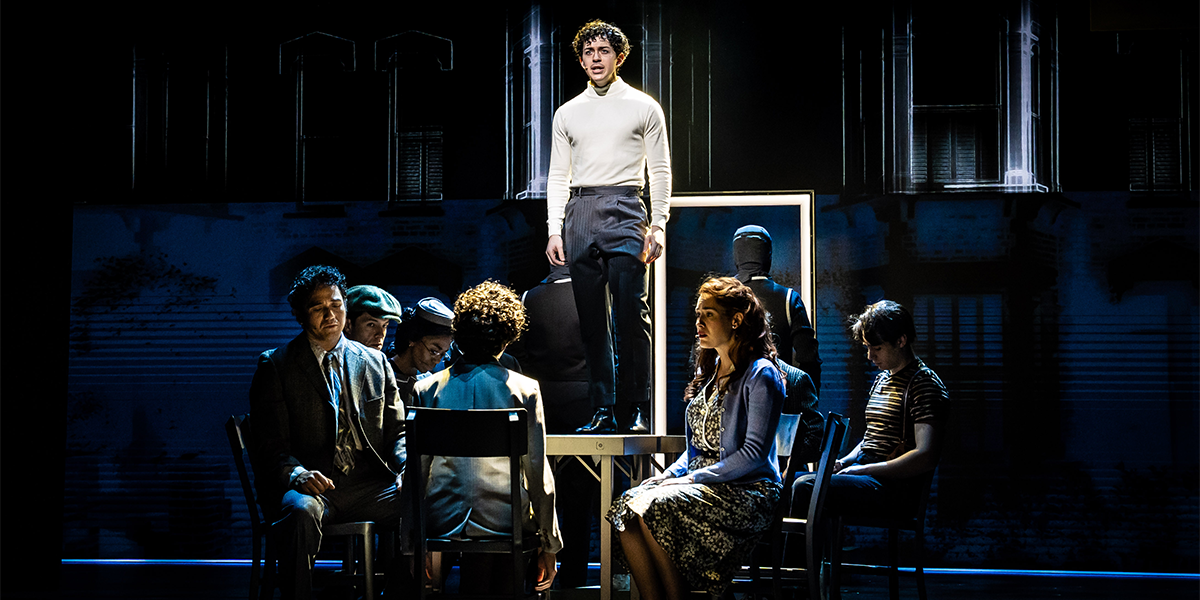
All the songs in 'The Who's Tommy' on Broadway
Hits from the band's groundbreaking 1969 album of the same name, like “See Me, Feel Me,” “We’re Not Gonna Take It,” and “Pinball Wizard,” make the score rock.
See me, feel me – and by all means, hear me. After all, the music of The Who's Tommy grabs you by the ears and draws you into a vivid and visceral place where the pinball wizard of the title is on his game.
Now back on Broadway, the show began as a 1969 concept album, Tommy, by the British rock band The Who. The record was adapted into a 1975 film and, in 1993, became a Broadway musical directed and co-written by Des McAnuff. He once again guides this revival, the show's first on Broadway.
Pete Townshend’s Tony Award-winning score blends rock, pop, and orchestral elements. “See Me, Feel Me,” “We’re Not Gonna Take It,” and “Pinball Wizard” are some of the hit songs that tell the tale of traumatized Tommy Walker (Ali Louis Bourzgui in his Broadway debut). He loses nearly all his senses but develops a talent for pinball, and goes down a trippy path to celebrity and self-realization.
The Who's Tommy offers a unique take on vulnerability, fandom, and healing, power chords and an Acid Queen included. Check out our guide to all the songs in the show, including all the timeless hits from the album and multiple reprises. Then see, feel, and hear The Who’s Tommy for yourself on Broadway.
“Captain Walker”
In 1941 wartime, officers announce the disappearance of one Captain Walker. “He’s believed to be missing with a number of men, don’t expect to see him again.” That leaves his expectant wife, Mrs. Walker, in limbo.
“It’s a Boy”
Nurses and Mrs. Walker celebrate the birth of Tommy, Captain Walker’s son. The infant’s arrival makes the future look promising.
“We’ve Won”
A few years tick by. Captain Walker and Allied soldiers rejoice as they’re liberated, unaware of the challenges awaiting them upon their return. Not on the concept album, this celebratory tune was fused with the previous song in earlier productions. In this revival, it stands alone.

“Twenty One”
Mrs. Walker marks her birthday with 4-year-old Tommy — and a new lover. “Gotta feelin’ 21 is gonna be a good year,” she says. Enter Captain Walker. A fight ensues, and the boyfriend dies. Tommy sees everything, but his parents convince him otherwise.
On the concept album, the song title is “1921,” which defies the timeline of the narrative. “Twenty One” leaves some wiggle room; perhaps Mrs. Walker is turning 21.
“Amazing Journey”
Tommy’s solo reveals his deep dive into his own inner world after losing the ability to see, speak, and hear after being traumatized by what he’s witnessed. “Sickness will surely take the mind where minds can't usually go,” he sings from inside his imagination. “Come on the amazing journey and learn all you should know.”
“Sparks”
This instrumental number ramps up the intensity and emotional wallop of the goings-on.
“Christmas”
It’s 1950 now. The joyful holiday compels Mr. Walker, accompanied by others, to express concern for Tommy’s soul, considering his son’s isolation. “Tommy, can you hear me?” he asks. “How can he be saved?”
Praised by critics, Townshend’s song was covered by Hamilton Tony Award winner Leslie Odom Jr. in the deluxe version of his Simply Christmas album.
“See Me, Feel Me”
“See me, feel me, touch me, heal me.” Tommy’s plaintive anthem and plea for connection emphasizes the universal desire for understanding. This number isn’t on the concept album, although it pops up in segments at various times. It was later released as a single and became its own number in the musical. The Who’s performance of “See Me, Feel Me” at Woodstock was a highlight of the legendary festival.
“Do You Think It’s Alright?”
Captain Walker and Mrs. Walker question whether they should leave Tommy in the care of his Uncle Ernie, a man who may not be a suitable guardian for reasons that become disturbingly clear.
“Fiddle About”
Uncle Ernie’s number, written by The Who's bassist John Entwistle, reveals an unsettling aspect of Tommy’s troubled early life. Despite the tune’s peppy tone, the subject matter makes your skin crawl.
“Cousin Kevin”
A bully with a sadistic streak, Cousin Kevin showcases a darker side of human nature in this number. “Do you know how to play hide and seek,” he asks his cousin, Tommy. “To find me, it would take you a week.”
Entwistle’s melody borrows inspiration from the piano song "Chopsticks," and the song's title character is based on an actual neighborhood oppressor from his childhood.
“Sensation”
Tommy and the ensemble marvel at his newfound inner consciousness, despite losing grip of his senses. He revels at the power that he radiates: “You'll feel me coming, a new vibration,” he sings. “From afar you'll see me, I'm a sensation.”
“Eyesight to the Blind”
Hawker, Harmonica Player, and the ensemble deliver a bluesy number about challenges and the restorative power of love. The song, titled "The Hawker" on the Tommy album, was originally written and recorded by Sonny Boy Williamson in 1951.
“Acid Queen”
The Acid Queen, a wheeler-dealer-healer, lends a psychedelic layer to the story. She tries to free Tommy’s mind with drugs and sex. Pop queen Tina Turner notably played the role in the 1975 Tommy film directed by Ken Russell. “If you child ain’t all he should be now,” she belted, “this girl could put him right.”

“Pinball Wizard”
“He’s got crazy flipper fingers.” Local Lads, Cousin Kevin, and the ensemble marvel at Tommy's incredible skill at playing “a mean pinball.” Tommy develops a cult following, despite his inner struggles, in this Act 1 finale.
Among the show’s most famous hits, the catchy song was released as a single in 1969. "Pinball Wizard" climbed to No. 4 in the U.K. and into the top 20 in the U.S. Ironically, Townshend has called his songwriting here “clumsy.”
“There's a Doctor”
It’s 1960. Captain Walker and Mrs. Walker grapple with raising Tommy. They’ll try anything to cure him. “There’s a man I’ve found could remove his sorrow, he lives in town, let’s see him tomorrow.” In the movie, that physician is played by none other than Jack Nicholson.
“Go to the Mirror!”
The Specialist observes that Tommy’s dissociative state isn’t physical — as Tommy can do things like focus on his own reflection — but mental. “His eyes react to light, the dials detect it,” the doctor tells the parents. “He hears but cannot answer your call.”
“Listening to You”
Tommy, at various ages, sings about the mighty power of connections. “Listening to you, I get the music. Gazing at you, I get the heat.” An example of how Tommy changed over time, this song isn’t even listed in the concept album. This song is about transformation, and it did plenty in its own right.
“Tommy, Can You Hear Me?”
Cousin Kevin and Local Lads and Lasses urgently express concerns about Tommy’s unresponsiveness to the external world. Musician Bob Dylan later took note of the song: It pops up as a lyric, along with a mention of the Acid Queen, in his song “Murder Most Foul.”
“I Believe My Own Eyes”
Captain Walker and Mrs. Walker confront the harsh reality that Tommy’s condition may be permanent. Townshend added this song to the musical to help flesh out the relationship between Tommy and his parents.
“Smash the Mirror”
Mrs. Walker’s desperation and frustration come out as she tries to communicate with Tommy. “Do you hear for fear, or do I smash the mirror?” She takes drastic action (hint: the song title) to release her son from his inner turmoil.

“I’m Free”
Tommy, suddenly fully receptive to the outer world, declares his liberation. He celebrates newfound freedom and self-realization.
The title speaks specifically to Tommy’s state, but it's been repurposed for various expressions of joy and liberation. A Saab commercial and the a celebration of Baltimore Orioles, for breaking their 1988 losing streak, are among the places the song has since been used.
“Miracle Cure”
“Extra! Extra! Read all about it.” Local Lads reflect on Tommy’s changing perceptions. The lyric mimics cries of newsboys and captures how Tommy’s transformation is headline-worthy news.
“Sally Simpson”
The impact of Tommy’s fame on Sally Simpson, one of his faithful followers, comes through in this number. It’s a stark and timeless musical commentary on the dangers of celebrity worship. A short time later, the show provides a reminder of how quickly fans can turn their backs on their idols.
“Welcome”
Tommy and the ensemble extend a warm invitation to those who wish to join his movement. He’s all about sharing a sense of unity and acceptance.
“Sally Simpson’s Question”
Sally Simpson seeks answers from Tommy as she tries to better understand him. “The point is not for you to be more like me,” he tells her. “The point is... I’m finally more like you.”
“We're Not Gonna Take It”
While it’s one of the most urgent and familiar numbers from Tommy, “We're Not Gonna Take It” wasn’t written expressly for the show, but as a general response to the political status quo and its stifling impact on people's lives. The song ultimately found a home in the show, and it’s been reworked for the 2024 revival.
“See Me, Feel Me”/“Listening to You”
In this final reprise of the songs, Tommy and the company reaffirm the central theme of connection and understanding.
Photo credit: The Who's Tommy in Chicago. (Photos by Liz Lauren)
Frequently asked questions
What is The Who's TOMMY on Broadway about?
The five-time Tony Award-winning rock sensation returns to Broadway. Pete Townshend and Des McAnuff's musical, inspired by the landmark album by The Who, tells the story of a catatonic boy-turned-pinball wizard with iconic songs like "We're Not Gonna Take It" and "I'm Free."
Where is The Who's TOMMY on Broadway playing?
The Who's TOMMY on Broadway is playing at Nederlander Theatre. The theatre is located at 208 West 41st Street (between 7th and 8th Avenue), New York, 10036.
How long is The Who's TOMMY on Broadway?
The running time of The Who's TOMMY on Broadway is 2hr 10min. Incl. 15min intermission.
How do you book tickets for The Who's TOMMY on Broadway?
Book tickets for The Who's TOMMY on Broadway on New York Theatre Guide.
What's the age requirement for The Who's TOMMY on Broadway?
The recommended age for The Who's TOMMY on Broadway is Ages 10+. Children under 4 years old will not be admitted..
Who wrote The Who's Tommy?
Pete Townshend (book, music, and lyrics) and Des McAnuff (book) wrote The Who's Tommy. Townshend is the co-founder, lead songwriter, guitarist, and vocalist for The Who, and McAnuff is a 10-time Tony Award winner who also directs Tommy.
Who directed The Who's Tommy?
Des McAnuff directs the Broadway revival of The Who's Tommy after winning a Tony Award for directing the original 1993 production. He also co-wrote the script with Pete Townshend.
What are the songs in The Who's Tommy?
The songs in The Who's Tommy include "Pinball Wizard," "See Me, Feel Me," "We're Not Gonna Take It," "The Acid Queen," and "I'm Free." Most of the musical's songs are pulled from the 1969 album of the same name by The Who.
Is The Who's Tommy musical the same as the album?
Yes, The Who's Tommy musical is largely the same as the album. The story of Tommy, told through the songs, is the same, and all the most famous songs from the album are in the show. However, Pete Townshend rewrote and reordered some of the songs for the stage show.
Is The Who's Tommy appropriate for kids?
The Who's Tommy is recommended for audiences 16 and older due to themes of bullying, war, and physical, sexual, and substance abuse. Please note that children 4 and younger are not permitted in Broadway theatres.
Is The Who's Tommy a true story?
No, The Who's Tommy is a completely fictional story. Real-life spiritual leader Meher Baba inspired Pete Townshend to write the songs, but none of the characters and events in the story of Tommy are real.
When was The Who's Tommy released?
The Who's Tommy album came out in 1969, and the film version followed in 1975. The Who's Tommy musical premiered on Broadway in 1993, and the current revival debuted in Chicago in 2023 before coming to Broadway in 2024.
Is The Who's Tommy good?
Yes — The Who's Tommy features time-honored songs by a globally bestselling band and a celebrated director who won a Tony for staging the show's premiere, and critical acclaim from the show's pre-Broadway run in Chicago. All these elements make Tommy one of the most talked-about revivals of the season.
Originally published on



